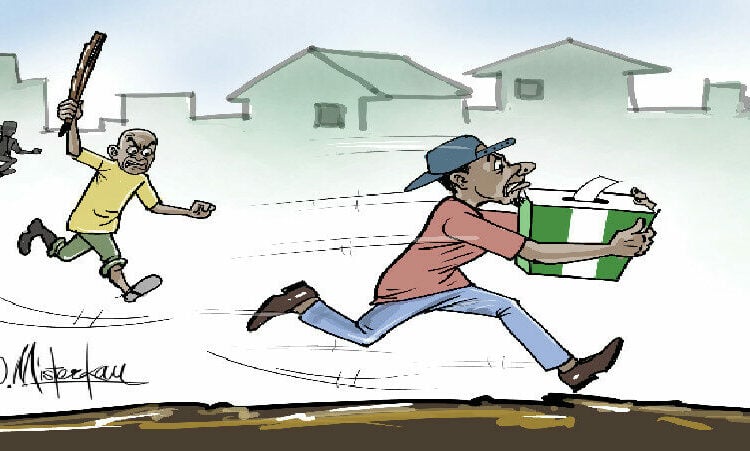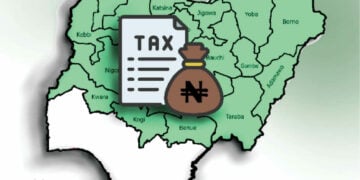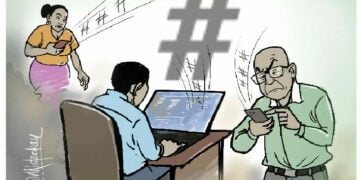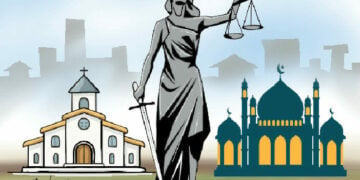Voter turnout is democracy’s vital sign, and ours has been fading. Since 2007, participation has fallen from 57% to 26.7% in 2023—our lowest since the return to civilian rule. Out of 93.47 million registered voters, only 24.9 million cast their votes. These are not just statistics; they are signals from the body politic that something is profoundly wrong. The urgency of the situation cannot be overstated. People are tired—of politics as theatre and outcomes that feel predetermined. They doubt that the ballot still shapes the course of their lives. The election of 2027 will therefore be more than a date; it will be a test of whether Nigeria still believes in itself. Election credibility is the most acceptable test for democracy.
What makes this moment urgent is not only the numbers but the psychology behind them. When citizens suspect that laws are ambiguous, that results may not be transparent, that offenders go unpunished, and that security agencies appear uneven or partisan, they withdraw their trust. The economy’s difficulties deepen the malaise, but the core wound is institutional: trust has thinned. In countries where participation approaches 80%, citizens believe that rules are clear, processes are transparent, and accountability is effective. Our gap is not merely comparative; it is structural. And when over a third of registered voters stay home, the silence fills with rumour, cynicism, and agitation. That vacuum is dangerous. It breeds narratives of exclusion, fuels separatist impulses, and weakens the legitimacy of every public decision made afterwards.
Flashback On The Eu Mission Report
The recent European Union follow-up mission did not tell us anything we did not already know; it simply held up a sharper mirror. Their 2023 Election Observation Mission made 23 recommendations; INEC’s own post-election review identified 142 internal improvements. Yet only eight of the EU recommendations were directly addressed to INEC, and just one of those was flagged as a priority. Most of what must change lies beyond the commission—in the hands of the legislature, the executive, and the Judiciary. That is the first truth to accept: INEC cannot rescue our democracy on its own. The second truth is more immediate and symbolic: the appointment of the INEC Chair is the first test of our seriousness to have a credible election. Handle it with transparency and merit, and the public will lean in; politicise it and we will have drained confidence before the starter’s pistol fires.
We should not comfort ourselves that things always right themselves. Elsewhere, the cost of electoral opacity is written in grief and displacement. Côte d’Ivoire’s disputed 2010–2011 polls spiralled into violence, with thousands dead and hundreds of thousands uprooted. Venezuela shows what happens when manipulation hardens into a permanent crisis; it hollows the centre and radicalises the margins. Pakistan’s recurrent controversies normalised a tense duet between civilian rule and military power. Zimbabwe’s repeated taint culminated in a military-assisted transition. No country is a perfect analogue, but the pattern is clear enough: when laws are elastic, results opaque, offences unpunished, and institutions politicised, politics leaks from ballot boxes into streets and barracks. We know this road. We should choose another.
The Roots Of Our Electoral Legitimacy Gap
The roots of our legitimacy gap are not mysterious. Our laws still harbour ambiguities that invite litigation and contradictory interpretations. Results management does not yet feel like a public window; when officials can see what citizens cannot, suspicion grows. Offences too often meet soft landings, and impunity breeds repetition. Security services, whether through real misconduct or perceived bias, cast long shadows on tight race days. Media and civic space feel pressured precisely when we need their light most. Women continue to face barriers along the candidacy and leadership ladder. And the everyday voter’s experience—queues without shade, materials arriving late, inaccessible locations, poor information—too often tells first-timers and persons with disabilities that their presence is an afterthought. None of this is inevitable. All of it is fixable if we treat 2027 as a deadline, not a decorative aspiration.
The needed changes are both simple and complex. The law must be clear—no more flexible deadlines, unclear rules, or phrases that mean different things in court and during vote counting. INEC appointments should be made transparently, based on merit, and protected from political manipulation. Electoral crimes need quick, clear penalties and deadlines. Inclusion must be real and written into law so women can fully take part throughout the election process. Institutions should work together with a public security neutrality agreement, proper training, and independent oversight that shares its findings openly. Election results must be published in real time with transparent, auditable data anyone can check. Logistics should plan for risks like power outages, connectivity issues, and bad weather. Voter registration and transfers must be easy for young people, mobile workers, and people with disabilities. Technology must be open, independently audited, tested publicly, protected against cyberattacks and fake news, with dashboards showing system status and problems. This comprehensive reform can change our elections and give hope for a better future.
Timing Of Electoral Reform Matters
The timing matters as much as the content. If we compress the legal work into the eve of elections, we will force administrators to improvise, and improvisation is the enemy of credibility. The next four quarters could map a cleaner path: pass core amendments and publish an appointment framework now; approve budgets early so that systems can be built, tested, and audited through 2026; train security agencies to doctrine and run nationwide simulations that expose weak joints before they snap; clean the voter roll and invite the public to check their details; accredit observers and open the doors to international missions; brief the media in plain language and put contingency plans on the table where every citizen can see them. Nothing in that sequence is exotic; it is simply the work of a state that intends to be believed.
Responsibility is widely shared, and clarity helps. The National Assembly writes and passes the amendments, funds the changes, and monitors execution without smothering it. The Presidency assents promptly, guarantees resources, and ensures neutrality across the security architecture. INEC makes the process legible and dignified for citizens, publishes performance data, and addresses issues revealed by audits.
Security agencies train to standards and publish their performance against them, including disciplinary actions when they fall short. The Judiciary sustains clear, expedited timelines for disputes and resists jurisprudential whiplash that turns law into a lottery. Parties practise internal democracy and focus on issues more than incantations. Media and civil society expand voter education, conduct real-time fact-checks, and provide parallel oversight without inflaming tensions. Citizens, companies, and the tech community pitch in—volunteering, building open-source tools, lending logistics support, and funding civic education. A credible election is not the triumph of a single institution; it is the alignment of many.
I have spent much of my professional life thinking about how institutions behave under stress and how leadership can prevent risk from escalating into a crisis. The struggle for electoral transparency is not administrative housekeeping; it is a test of national steadiness. My book “Leading in a Storm“ is about crisis leadership when uncertainty is high and trust is low. “Beneath the Surface” gathers essays on how policy choices ripple through society. Both works will be presented publicly—Abuja on October 14th and Lagos on October 16th—not as self-promotion, but as an invitation to a broader conversation: how we turn apathy into agency and fear into resolve.





